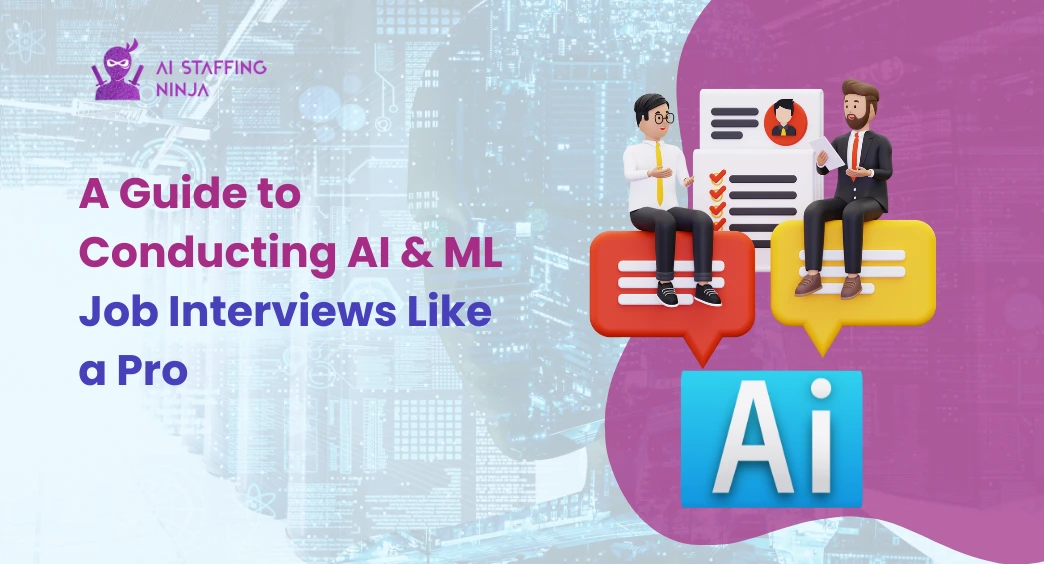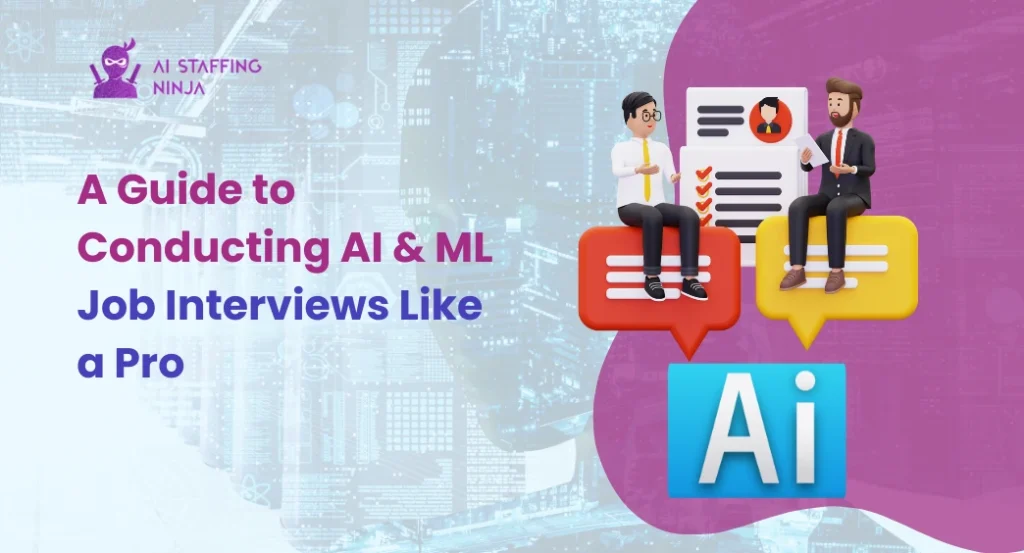
- By : By Staffing Ninja
How to Conduct Effective Interviews for AI Positions

AI talent acquisition requires a systematic planning process for the interview procedure. In order to achieve successful outcomes, AI job roles and interviews necessitate an assessment of technical expertise and cultural compatibility. First, identify technical role specifications as well as organizational cultural expectations. The interview process must contain two sections using specific questions to evaluate technical skills from coding tasks, algorithm design, and interpersonal abilities through collaborative problem-solving activities. Interview preparation necessitates a thorough resume review and strategy. The final stage entails actively engaging interview candidates while conducting the interview with a targeted approach. The hybrid approach enhances candidate discovery for appropriate personnel selection.
Understanding the Role and Requirements
AI talent recruitment success depends on having a precise definition of the role. A job description that is appropriately defined serves as the fundamental element for conducting successful interviews.
Defining the AI Position
A precise definition of the AI position is necessary to commence the AI recruitment process. A detailed job description serves as a guide for recruiters and candidates to ensure that they understand the needs of their roles. The description must specifically mention the essential technical skills, such as machine learning, data science knowledge, and expertise with particular AI algorithms. The job description must include both fundamental technical skills and clear definitions of soft skills, such as adaptability, communication, and problem-solving abilities.
Identifying Key Competencies
The process of evaluating candidates becomes more efficient if the necessary competencies are identified. Analytical skills, collaboration, and problem-solving abilities comprise the most important competencies for success. The interview assessment method should be employed to evaluate technical competencies and interpersonal abilities. Competency assessments should incorporate scenario-based questions, practical evaluations, and specific interview questions that replicate real-world work challenges.
Preparing for the Interview
A suitable preparation process ensures that AI interviews get the intended results. Through a rigorous interview procedure, organizations can treat all candidates fairly while employing predetermined assessment techniques.
Developing a Structured Interview Format
The evaluation system necessitates a transparent interview structure to guarantee consistency and impartiality in employee evaluations. Interviews require both skill-based evaluation approaches and behavioral question formats. The technical evaluation determines how well applicants solve problems and develop code. Behavioral interview questions evaluate personal attributes and soft skills based on previous job experiences and problem-solving approaches. The evaluation process concludes with the integration of all assessment methods.
Crafting Relevant Questions
The interview should focus on topics that directly assess the AI role requirements. The questions should evaluate both the candidate’s technical knowledge and their interpersonal abilities. To assess their AI concepts, the candidate must exhibit a basic understanding of AI fundamentals, particularly machine learning and deep learning algorithms. Behavioral assessment questions are appropriate for the evaluation process since they disclose how applicants handle teamwork and conflict management at work. Open-ended questions allow candidates to explain their responses, demonstrating their comprehensive thinking methods.
Conducting the Interview
The interview process reveals candidates’ technological proficiency as well as their interpersonal interaction skills. An ideal interview environment allows candidates to demonstrate their best skills.
Creating a Comfortable Environment
When provided with a comfortable environment during their interview, candidates are capable of delivering their best performance. To ensure that candidates have a favorable experience, the first step must include clarifying interview protocols. Candidates are encouraged to be honest and show their true capabilities in a calm, welcoming environment. In technical interviews, this is particularly critical, as a nervous candidate may find it difficult to exhibit their maximum potential. Maintain professional behavior toward interviewees at every point throughout the interview process.
Evaluating Technical Skills
Practical assessments provide the most effective way to measure a candidate’s technical skills. Develop assessment tasks that replicate the challenges they would encounter on the job. Coding challenges, case studies, and problem-solving exercises all help to improve the evaluation process. The evaluation process should center on witnessing applicants utilize their technical skills rather than just testing their theoretical grasp. This evaluation technique demonstrates a person’s ability to accomplish their daily work responsibilities.
Assessing Soft Skills
When it comes to AI jobs, soft skills are just as important as technical competencies. A successful team involves both effective communication channels and teamwork adaptability. People should share their work experiences and demonstrate their approach to conflict resolution, teamwork, and adaptability to changing job requirements. Soft skill assessments examine how an individual will adapt to the company culture and assist their coworkers.
Post-Interview Evaluation
The primary determinant for hiring suitable candidates is the post-interview assessment procedure. The best candidate is selected after a thorough evaluation of all candidate responses.
Reviewing Candidate Responses
The critical component that follows the completion of an interview is the evaluation of the candidate’s response. Compare the responses to technical and behavioral questions. Advanced problem-solving skills combined with deep knowledge of AI concepts must be evident in the technical responses of candidates. The competency requirements of candidates must be verified through the assessment of behavioral responses.
Making an Informed Decision
Hiring decisions should be made after an extensive investigation of each candidate’s technical skills, soft abilities, and cultural compatibility. Assessment must evaluate both candidate interview skills and their compatibility with team values and work approach. Devote sufficient time to thoroughly evaluate each candidate before making your final selection. The comprehensive assessment approach enables organizations to recruit candidates who possess the skills required for current roles and prospective organizational success.
Wrap Up
A successful AI candidate assessment combines the evaluation of both technical proficiency and social abilities. To succeed in AI talent selection, organizations must use a structured approach that incorporates specific questions, practical assignments, and cultural assessment. A well-planned evaluation process following interviews enables firms to identify candidates who excel at both technical skills and team collaboration. Organizations gain high-quality AI recruitment solutions through extensive interview sessions, resulting in significant organizational success.